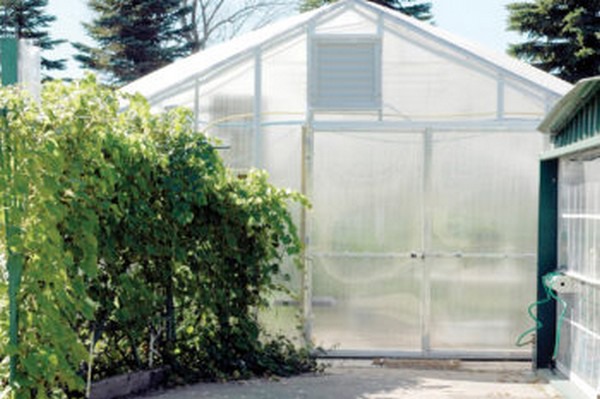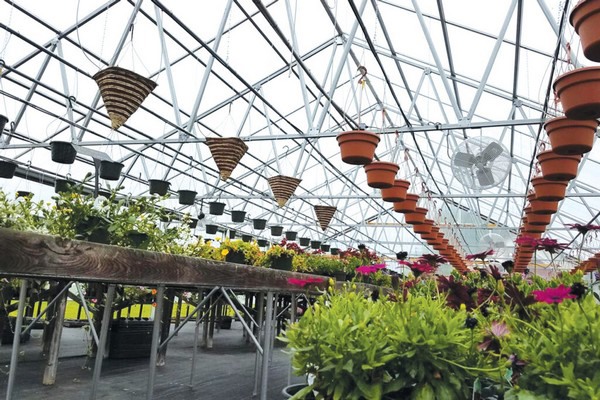In greenhouse crop production, an operation is only as effective as its structure’s cladding. To produce consistent, high-quality harvests year-round, growers need a cladding that will help create ideal conditions for their crops, regardless of the environment outside.
Along with improved plant growth, the best material will also limit monthly operating costs and help growers increase their bottom line. For these reasons, many greenhouse growers today are opting for polycarbonate panels to cover their structures.
Polycarbonate panels offer growers a superior cladding solution, delivering effective light transmission and diffusion, simplifying maintenance, and improving their structure’s heat retention. They also present a number of options to choose from, which means operations in any region can use polycarbonate panels to improve their business.
What are polycarbonate sheets?
Polycarbonate panels are sheets made from rigid plastic that are nearly as transparent as glass. Their material offers sufficient impact resistance and creates one of the strongest greenhouse coverings available to growers.
In addition to superior strength, polycarbonate panels provide a greenhouse with high levels of both light transmission and light diffusion. An ideal range for light transmission in greenhouse production is typically considered between 80 and 90 percent. Polycarbonate greenhouse panels hover at both ends of that threshold, depending on their thickness and number of layers.
8 mm twin-wall polycarbonate offers a light transmission rate of around 80 percent. This allows most crops to thrive and mitigates the risk of them overheating or being scorched by excessive sunlight.
This is also the case with light diffusion. Crops generally grow better with diffused light because it reaches all around them and is distributed more evenly. Polycarbonate panels employ diffused light to promote uniform crop growth and limit the amount of direct light that hits the top of crops. Too much harsh, direct light can potentially hinder crop development.
Polycarbonate greenhouse panels are designed to give growers a more convenient solution as well. They are shatter-resistant and virtually unbreakable, which simplifies transportation to sites because the polycarbonate panels are less likely to be damaged during shipping. These sheets are also lightweight, so they can be easily cut and installed in larger sections, streamlining greenhouse construction.
How long does polycarbonate last on a greenhouse?
Polycarbonate greenhouse panels are extremely durable and provide operations with a reliable covering that lasts years. In both single-layer and twin-wall, these polycarbonate panels are highly impact-resistant and feature a 10-year warranty.
This resistant polycarbonate is a cost-effective material that delivers high performance during its lifespan. To potentially increase life expectancy, growers can treat their polycarbonate panels with a UV protectant that helps prevent fading or discoloration.
Types of polycarbonate panels
There are two primary types of polycarbonate panels that greenhouse growers choose between, single-layer and twin-wall. With either choice, operations can use this cladding to establish an ideal growing environment that produces more robust yields.
Single-Layer – GrowSpan’s single-layer sheets are corrugated, meaning they have a wave or box-like shape with peaks and valleys built into the design. These polycarbonate greenhouse panels supply a high degree of light transmission, reaching levels of up to 90 percent.
While having a similar clarity to glass, single-layer panels are more durable and lightweight and are far easier to install and maintain. Since they only feature one layer of cladding, single-layer polycarbonate panels are a great option for greenhouse growers who don’t deal with cold winter temperatures.
Twin-Wall – Multiwall polycarbonate panels are designed for impact strength and heating efficiency, so they work particularly well for operations located in colder climates. They are designed with gaps between their layers that trap air, which helps to retain heat and limit energy consumption in a greenhouse.
In 8 mm thickness, these polycarbonate panels not only offer abundant light transmission and diffusion, but the material also acts as a natural ultraviolet filter that shields crops from harmful radiation. With thicker polycarbonate, growers can block virtually all UV penetration in their structure.

Increasing R-value with polycarbonate greenhouse panels A greenhouse’s ability to retain heat is measured by the R-value of its cladding. The higher the R-value, the better a greenhouse will be at preserving heat and maintaining interior temperatures.
Compared to film or glass cladding, polycarbonate greenhouse panels supply the greatest R-value. To grow year-round in a colder climate, operations need an effective cladding that’s capable of regulating greenhouse temperatures in spite of the outdoor chill.
Consistent temperatures promote uniform growth, and by not allowing heat to escape the structure, growers can make their greenhouse far more energy-efficient. In addition to saving on utility costs, growers will also put less strain on their heating system, giving it a longer lifespan and helping them avoid buying expensive new equipment.
Air has an excellent insulating property and can be highly effective for retaining heat in a greenhouse environment. Since twin-wall polycarbonate panels trap air between their layers, they produce one of the highest R-values of any greenhouse cladding.
8 mm twin-wall sheets provide an R-value of 1.72, which is higher than what growers can achieve with other claddings, like single-layer film or 3 mm glass. To learn more about the R-values of various claddings and how to optimize heating in a greenhouse, read this past blog.
Polycarbonate greenhouse panels are quickly becoming a favorite choice amongst growers, and it’s easy to see why. For growers who need to thrive in cold weather or just want to give their operation a boost, polycarbonate panels offer the perfect solution for improving crop growth and increasing profits.
For more information: GrowSpan Greenhouse Structures
GrowSpan Greenhouse Structures
[email protected]
www.growspan.com










